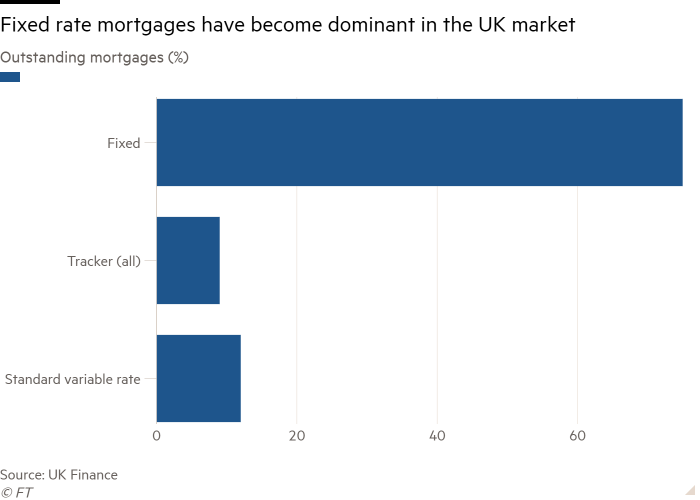Millions of people struggling with the rising cost of living are facing growing financial pain over the coming months as higher UK inflation leads to surging bills for variable and fixed-rate mortgage borrowers.
The Bank of England on Thursday raised its main interest rate by 0.5 of a percentage point to 1.75 per cent, the largest increase in 27 years.
Around 2mn people in the UK either have home loans with standard variable rates or tracker mortgages, which follow the BoE’s base rate.
Barclays and Santander were among several lenders to say their standard variable-rate mortgages would increase by 0.5 percentage points following the announcement. Nationwide, HSBC and NatWest are yet to make a decision on changing standard variable-rate products but will increase tracker mortgage rates in line with the BoE’s decision.

Borrowers on fixed-rate mortgages — the prevalent type of home loan in the UK — are protected from immediate changes in interest rates. However around 40 per cent of these are set to expire this year or next, exposing borrowers to higher rates.
“The people who are going to feel this immediately are on the variable deals — particularly those on standard variable rates,” said David Hollingworth, associate director at L&C Mortgages.
“But there’s not too much room for complacency for those who are on fixed rates, which have been moving astonishingly quickly since the end of last year.”
Several big lenders had made changes to their fixed-rate products ahead of the BoE announcement, with Halifax, NatWest and HSBC raising rates on a number of their fixes, and lenders including Co-operative Bank and Leeds Building Society withdrawing selected fixed-rate deals.
According to Moneyfacts, a 0.5 percentage point rise in the current average standard variable rate of 5.17 per cent would add £1,400 to a total home loan bill over two years, based on a £200,000 repayment mortgage.
But borrowers who switched to a fixed-rate deal could make substantial savings. Moving to a two-year rate at the current average of 3.95 per cent would save about £3,333 over two years, Moneyfacts said.
Alongside its rates decision, the BoE said that it expected inflation to rise above 13 per cent by the end of the year — significantly higher than its May forecast — following the latest surge in gas prices.
Housing market experts pointed to the impact of this bleak economic outlook on house prices, which have fallen for the first time in a year, according to Halifax, one of the UK’s biggest mortgage lenders. It said on Friday that average house prices dropped 0.1 per cent in July, noting that “rising borrowing costs are adding to the squeeze on household budgets”.
Halifax cautioned against setting too much store against one month’s data, particularly when the supply of housing remained tight. However, managing director Russell Galley said the leading indicators suggested a softening of activity in recent weeks — and more to come.
“Looking ahead, house prices are likely to come under more pressure as . . . the headwinds of rising interest rates and increased living costs take a firmer hold.”
UK households face growing pressures on their household spending, with fuel and food prices surging in part due to the Russian invasion of Ukraine.
“The cost of living crisis, interest rate rises and house price growth could price out would-be buyers if they have little disposable income and subsequently eat into their savings,” said Rachel Springall, finance expert at Moneyfacts.
Rate rises can nonetheless be good news for savers, who see bigger returns on their cash. But few banks have yet passed on increases in full to savers from successive BoE rate rises over the past eight months.
Santander said it would increase rates on its 123 current account, junior Isa and first home saver account, so that customers would earn 1 per cent a year on balances up to £20,000. The move represents a rise of 0.25 percentage points, half the BoE base rate rise — though its Help to Buy Isa will see the full rise passed on.
Laura Suter, head of personal finance at investment broker AJ Bell, said savers would continue to benefit from increased competition between banks on their savings rates after the BoE began raising base rates last year.
“The leap in rates should put fuel into that savings boom,” she said. “However, with inflation now expected to go higher and for longer, savers are being rewarded on the one hand but seeing far more taken on the other.”
In July, William Chalmers, chief financial officer of the UK’s largest mortgage provider Lloyds Banking Group, said the lender had seen a “light softening” in new applications for mortgages but that remortgaging activity remained strong.


